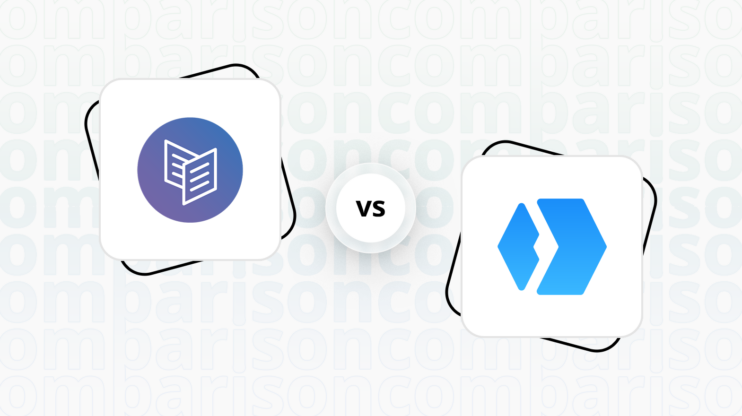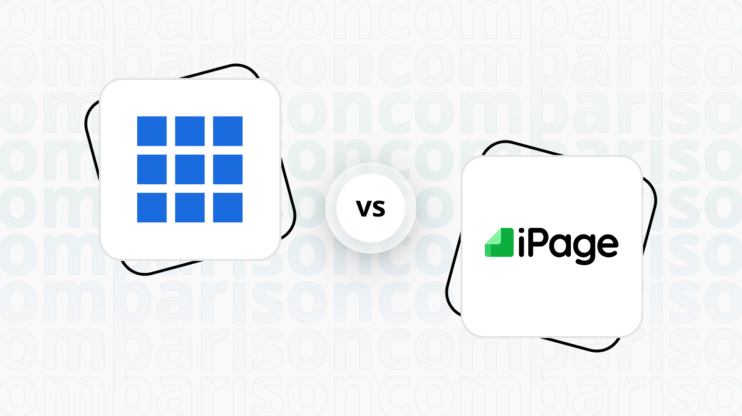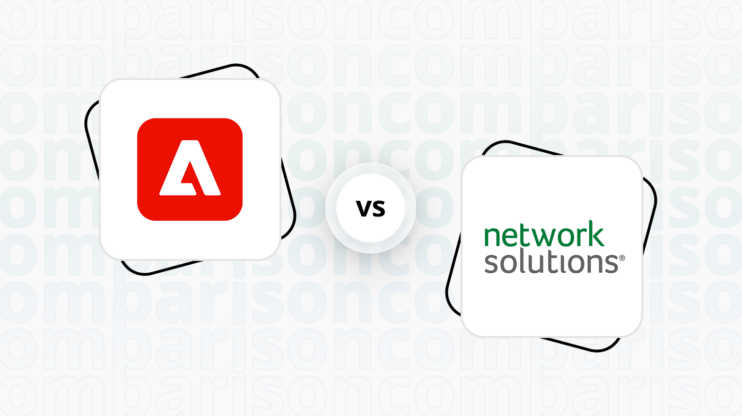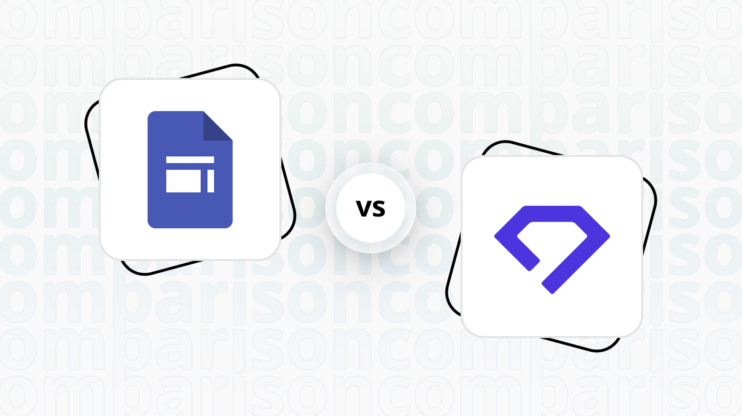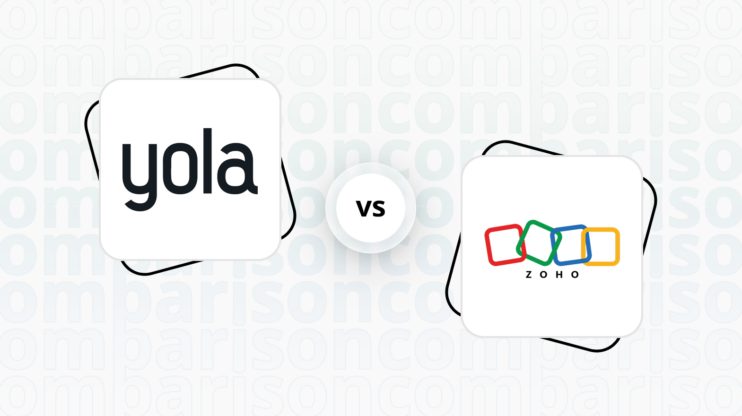Final verdict
Voog and Webnode both offer user-friendly website building experiences, but they cater to slightly different needs and preferences.
-
Voog (Overall Grade: 6.7/10)
stands out for its multilingual support and robust customization options, making it an excellent choice for international businesses and users looking for a versatile platform. Voog’s ease of use, combined with its strong design functionalities and responsive templates, provides a solid foundation for creating professional websites. However, its ecommerce capabilities and plugin integrations, while adequate, may not be as extensive as some users might require. -
Webnode (Overall Grade: 6.5/10)
, on the other hand, excels in providing a straightforward and quick website creation process, ideal for beginners and those seeking a simple, no-fuss solution. Webnode’s drag-and-drop interface, combined with a variety of templates and basic ecommerce features, makes it a suitable option for small businesses and personal websites. While it may lack some advanced customization and integration options, Webnode’s affordability and ease of use make it a compelling choice for users with basic website needs.

|

|
|
|---|---|---|
|
Design functionalities & templates |
7.4 |
7.1 |
|
Ease of use |
8.1 |
8.0 |
|
Ecommerce |
6.9 |
6.3 |
|
Website Editors |
7.6 |
7.3 |
|
Product testing options |
8.6 |
5.3 |
|
Price |
7.5 |
7.7 |
|
Hosting quality |
7.7 |
6.3 |
|
Website speed optimization |
6.2 |
6.1 |
|
Plugins and integrations |
6.7 |
6.8 |
|
Marketing features |
6.9 |
5.5 |
|
Customer support |
6.1 |
5.3 |
|
Security |
7.7 |
7.7 |
|
AI capabilities |
0 |
5.3 |
|
User Management |
7.3 |
6.9 |
Best for ecommerce
 6.9
6.9
 6.3
6.3
Verdict
: Voog and Webnode both offer solid ecommerce capabilities, but Voog edges out Webnode with a slightly higher score and more versatile features, especially for international businesses.
-
Voog
: Voog is praised for its simplicity and multilingual support, making it suitable for small businesses and individuals looking to launch online stores with ease. It offers various payment methods, customizable templates, and tools for order management and global shipping. However, its customization options might be limited for businesses with advanced ecommerce needs. Voog’s ecommerce score: 6.9. -
Webnode
: Webnode provides a user-friendly interface and is ideal for beginners who want to create simple online stores quickly. It offers basic ecommerce features like product management, various payment options, and order management. However, its customization options and scalability might be limited for larger businesses. Webnode’s ecommerce score: 6.3.
Best for informational & business websites
 7.5
7.5
 7.2
7.2
Verdict
: Voog slightly edges out Webnode for informational and business websites due to its robust customization options and multilingual support, making it ideal for international audiences.
-
Voog
: Voog is a versatile website builder designed for creating and managing websites with a strong focus on simplicity and design. It offers an intuitive drag-and-drop interface, making it easy for both beginners and experienced web developers to create professional-looking websites without needing to write code. Voog stands out for its multilingual support, allowing users to easily create and manage websites in multiple languages, making it an ideal choice for international businesses and personal sites aiming for a global audience. Additionally, it provides a range of customizable templates, SEO tools, and responsive design options to ensure websites look great on all devices. -
Webnode
: Webnode is a website builder that allows you to create a website without needing any coding knowledge. It uses a drag-and-drop interface, which means you can simply move elements around the page to create your desired layout. Webnode offers free plans, but these have limitations on storage and features. Paid plans offer more storage, custom domain names, and the ability to remove Webnode ads from your website. Overall, Webnode is a good option for beginners who want to create a simple website quickly and easily.
Detailed comparison
Design functionalities & templates
Design FunctionalitiesRepresents how well each platform allows for creative design and customization of websites.Score Components:
- Template Variety (30%): Range and quality of design templates.
- Customization (30%): Flexibility and options for design alterations.
- User Interface (20%): Ease and intuitiveness of the design process.
- Responsiveness (10%): Adaptability to different devices and screen sizes.
- Innovation (10%): Unique design features and tools.
 7.4
7.4
 7.1
7.1
🏆
Winner: Voog.
Voog edges out Webnode in this category due to its robust customization flexibility and multilingual support, making it an ideal choice for international businesses and personal sites aiming for a global audience.
Voog offers a diverse range of design templates across various categories tailored for different website types such as business services, online stores, blogs, and more, catering to a wide audience. The platform highlights specific templates for creating visually appealing and functional webstores and blogs, emphasizing user-friendly design and mobile responsiveness.
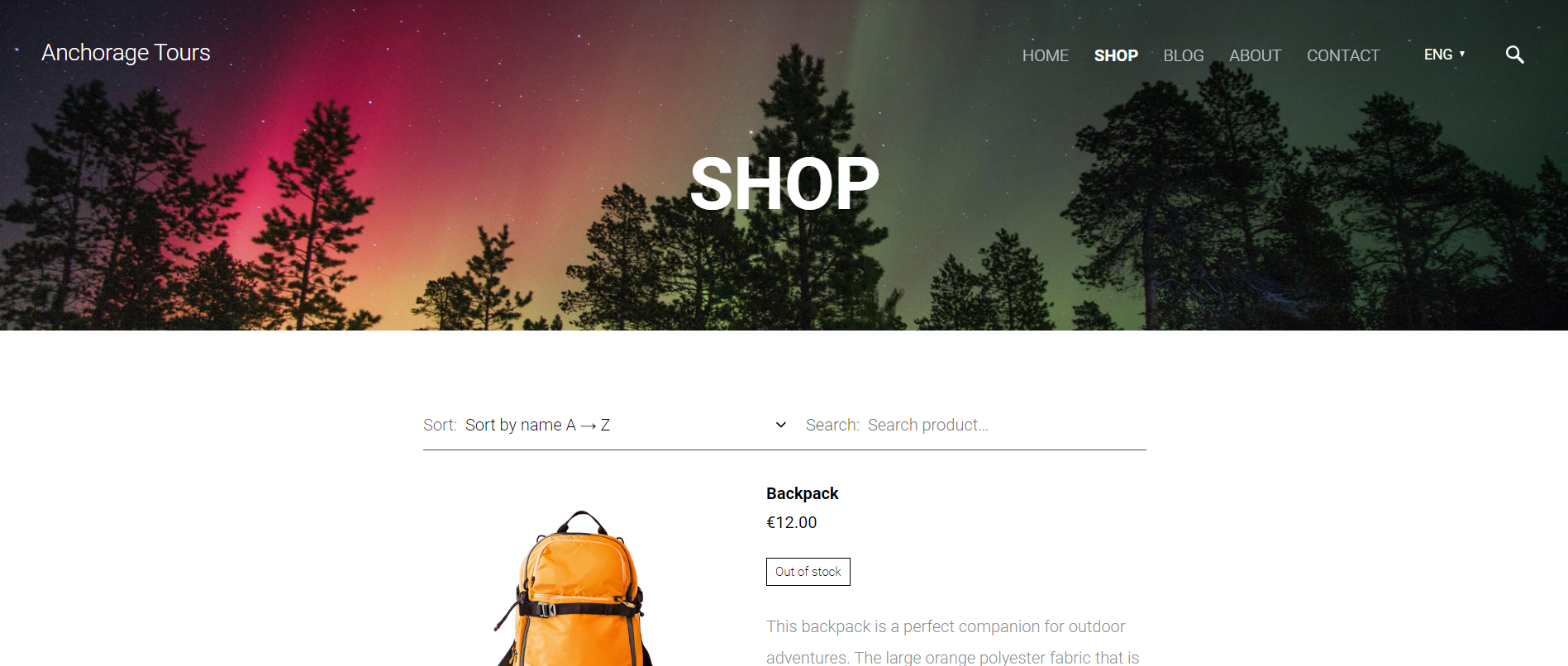
On the other hand, Webnode offers a variety of website templates designed for different purposes, from business and portfolios to restaurants and travel. These templates are customizable and responsive, ensuring they display well on any device.
Get a head start on website creation with AI
Create a custom website tailored to your business needs 10X faster with 10Web AI Website Builder!
Ease of use
Ease of useReflects the platform’s overall user-friendliness.Score
Components:
- Learning curve (40%): Quickness and ease of getting started.
- Interface design (30%): Simplicity and intuitiveness of layout.
- User guidance (20%): Quality of tutorials and support.
- Flexibility (10%): Adaptability to various user skills.
 8.1
8.1
 8.0
8.0
🏆 Winner: Voog
. Scoring a slightly higher 8.1, Voog edges out Webnode in terms of ease of use. Both platforms offer user-friendly interfaces and drag-and-drop functionality, making them suitable for beginners. However, Voog’s multilingual support and responsive design options give it a slight advantage.
Learning Resources
🏆 Winner: Tie
. Both Voog and Webnode offer extensive learning resources, including detailed guides, video tutorials, and support channels. However, both platforms lack a large community of users, which could be a valuable resource for learning and troubleshooting.
For ecommerce
EcommerceMeasures the platform’s effectiveness in supporting online business activities.Score Components:
- Ecommerce themes and templates (20%): Variety and design of templates.
- Product management (25%): Ease of managing and organizing products.
- Payment options (25%): Variety and convenience of payment methods.
- Ecommerce features (20%): Features for managing an ecommerce store.
- Integration (10%): Compatibility with external e-commerce tools and services.
 6.9
6.9
 6.3
6.3
Voog and Webnode both offer ecommerce capabilities, but they cater to different needs. Voog is praised for its simplicity and responsiveness, making it suitable for individuals and small businesses looking to launch online stores with ease. It supports multilingual websites, various payment methods, and customizable templates, alongside tools for order management and global shipping. However, businesses with advanced or specific ecommerce requirements might find its customization options somewhat limited compared to dedicated ecommerce platforms.
Webnode’s ecommerce features include an online store builder, product management tools, various payment options, and basic analytics. However, users may find its customization options limited compared to other platforms, and transaction fees could impact profitability. Integration capabilities may also be constrained, and scalability might be a concern for larger businesses.

|

|
|
|---|---|---|
|
Ecommerce themes and templates |
6.5 |
6.5 |
|
Product page customization |
6.8 |
7.0 🏆 |
|
Payment processing and commissions |
7.0 🏆 |
6.8 |
|
POS capabilities |
5.0 🏆 |
4.0 |
|
Payment gateways |
7.5 🏆 |
7.0 |
|
Product numbers |
5.5 |
5.5 |
|
Additional ecommerce features |
6.0 |
6.0 |
Voog ecommerce features:
- Order management
- Global shipping
- Product variants
- Payment gateways integration
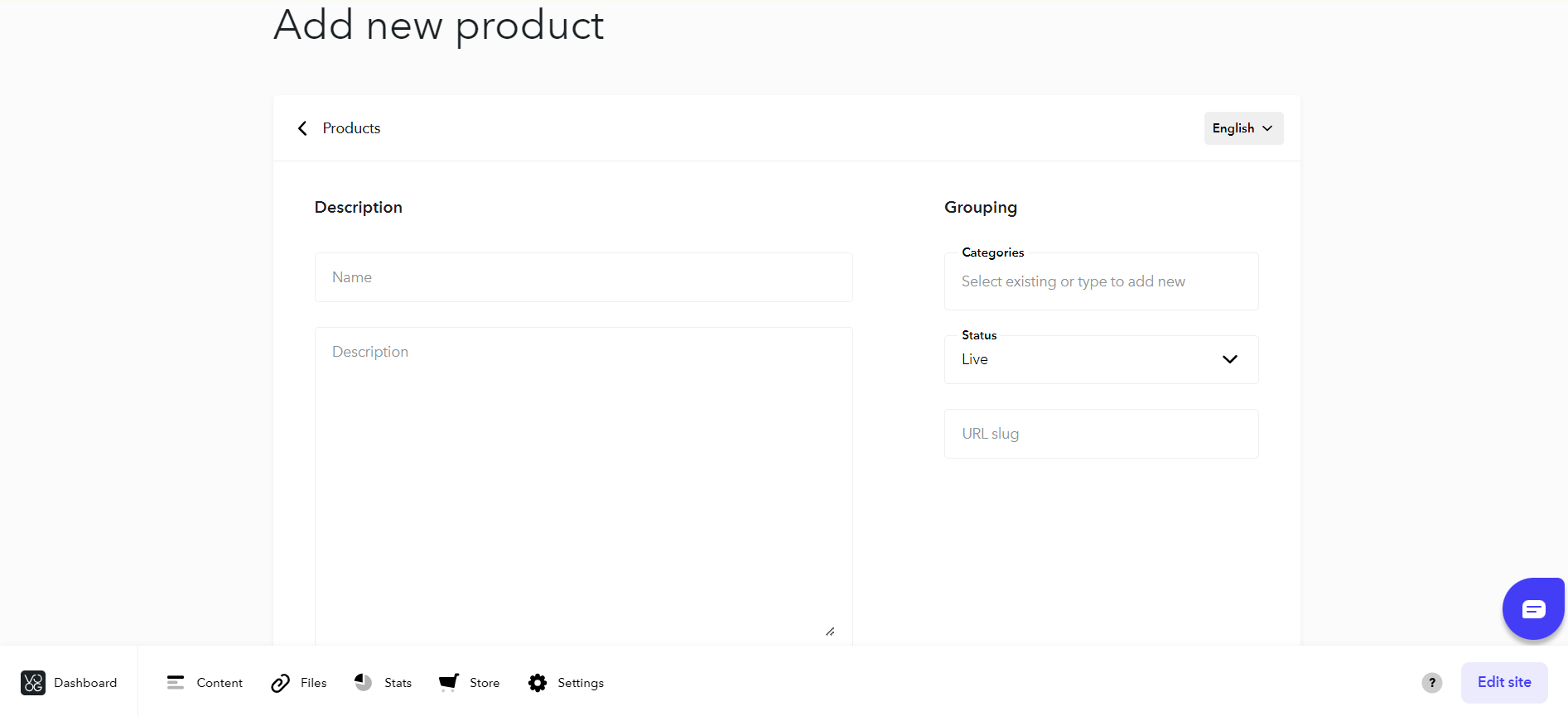
Webnode ecommerce features:
- Shipping options
- Payment gateway integrations
- Order management
- Coupons and discounts
Ecommerce themes & templates
For ecommerce, Voog highlights around 18 templates optimized for building online stores. These templates are praised for their attractive landing pages, spacious backgrounds for product images, and structured product and product list layouts, which aim to create a user-friendly browsing experience similar to visiting a physical store.
Webnode offers ecommerce-specific templates designed for creating online stores, though the exact number of templates available may vary over time. These templates typically come with features such as product showcasing, shopping cart functionality, support for various payment gateways, and customization options.
Product page customization
Voog website builder provides functionality for customization of product pages within an online store. It enables the modification of various product aspects such as names, descriptions, categories, visibility status, and URL slugs. The system also allows for the inclusion of multiple images per product, and offers settings for net and sale prices, VAT rates, and inventory tracking. Voog facilitates the creation of product variants, like different colors or sizes, and allows for the adjustment of stock levels and variant visibility.
Webnode provides users with extensive customization options for product pages, allowing for the creation of visually appealing and informative displays. Through customizable content blocks, product images and galleries, and tailored product descriptions, users can effectively showcase their products.
Payment processing
Voog supports a variety of payment gateways to accommodate diverse online transaction needs. Supported gateways include Swedbank Payment Gateway, Bank links through MakeCommerce (Nordics and Baltics), Montonio, Stripe, PayPal, EveryPay (for card payments and payment initiation), and Luminor Payment Gateway. These options offer flexibility in payment methods, catering to users in different regions and with different banking preferences. Voog also details its transaction fees, including a 3% fee for standard sales, while premium plan subscribers enjoy the benefit of no transaction fees.
Webnode website builder supports various payment gateways, including popular options like PayPal and Stripe, for online transactions. While Webnode itself doesn’t charge commissions on transactions, payment gateways may have their own fee structures. Webnode primarily focuses on facilitating online transactions and doesn’t provide native POS capabilities, although integration with third-party POS solutions may be possible.
Website Editors
Website EditorsEvaluates the platforms’ website building and editing capabilities.Score Components:
- Customization tools (40%): Range and power of editing features.
- Editor usability (30%): User experience within the editor.
- Design flexibility (20%): Freedom in layout and design changes.
- Update and maintenance ease (10%): Simplicity of updating and maintaining the site.
 7.6
7.6
 7.3
7.3
🏆
Winner: Voog
. Voog, with a score of 7.6, offers a powerful and user-friendly website builder editor. It caters to a wide range of needs from basic blogs to complex, multilingual websites. It offers a rich array of features including customizable templates, SEO tools, e-commerce functionalities, and developer-friendly tools for advanced customization. With its strong multilingual support, Voog stands out as an ideal choice for creating international websites, ensuring accessibility for a global audience.
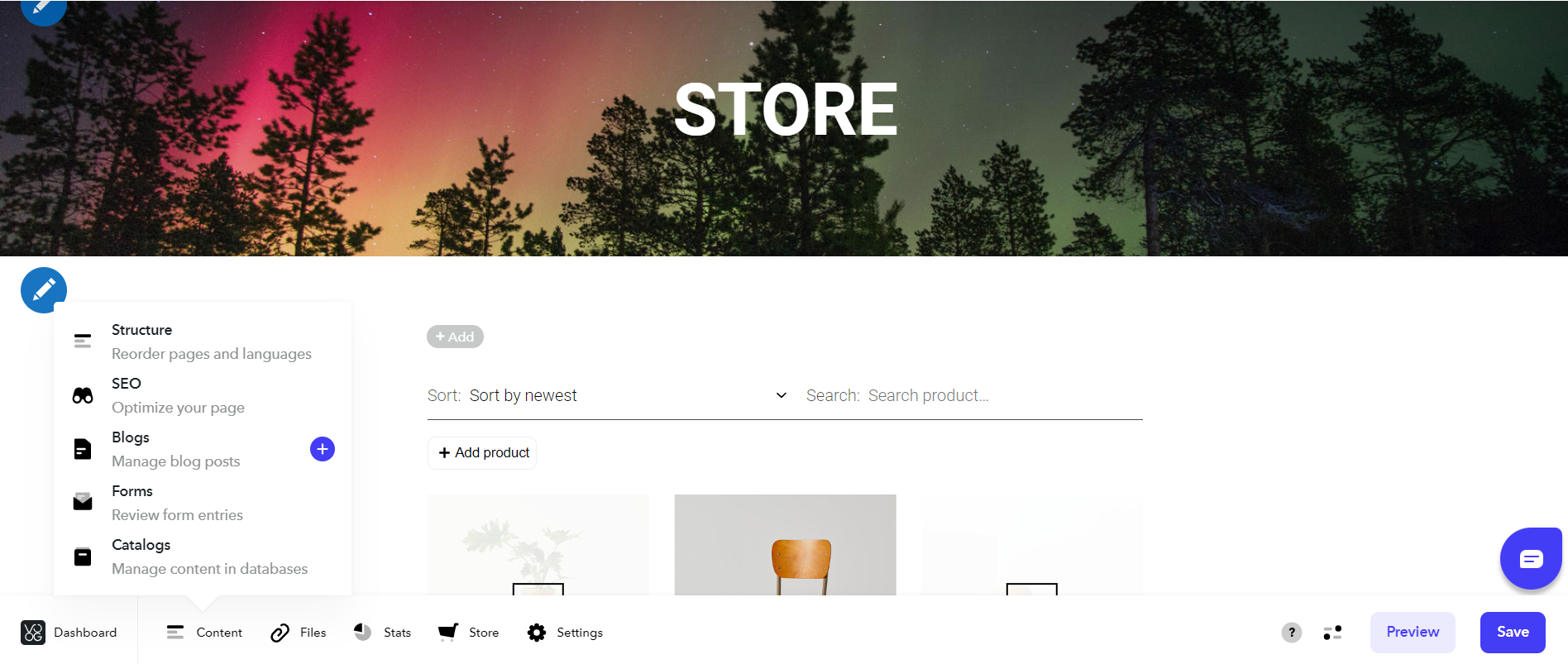
Webnode’s website builder, scoring 7.3, features a user-friendly drag-and-drop interface with customizable templates, enabling users to easily create professional-looking websites without coding skills. The editor offers responsive design capabilities and multilingual support, catering to diverse audiences across different devices and languages. Built-in features such as SEO tools, e-commerce functionality, and analytics integration empower users to optimize their websites for search engines, sell products online, and track performance metrics effectively.
Mobile editor/app
 5.5
5.5
 5.5
5.5
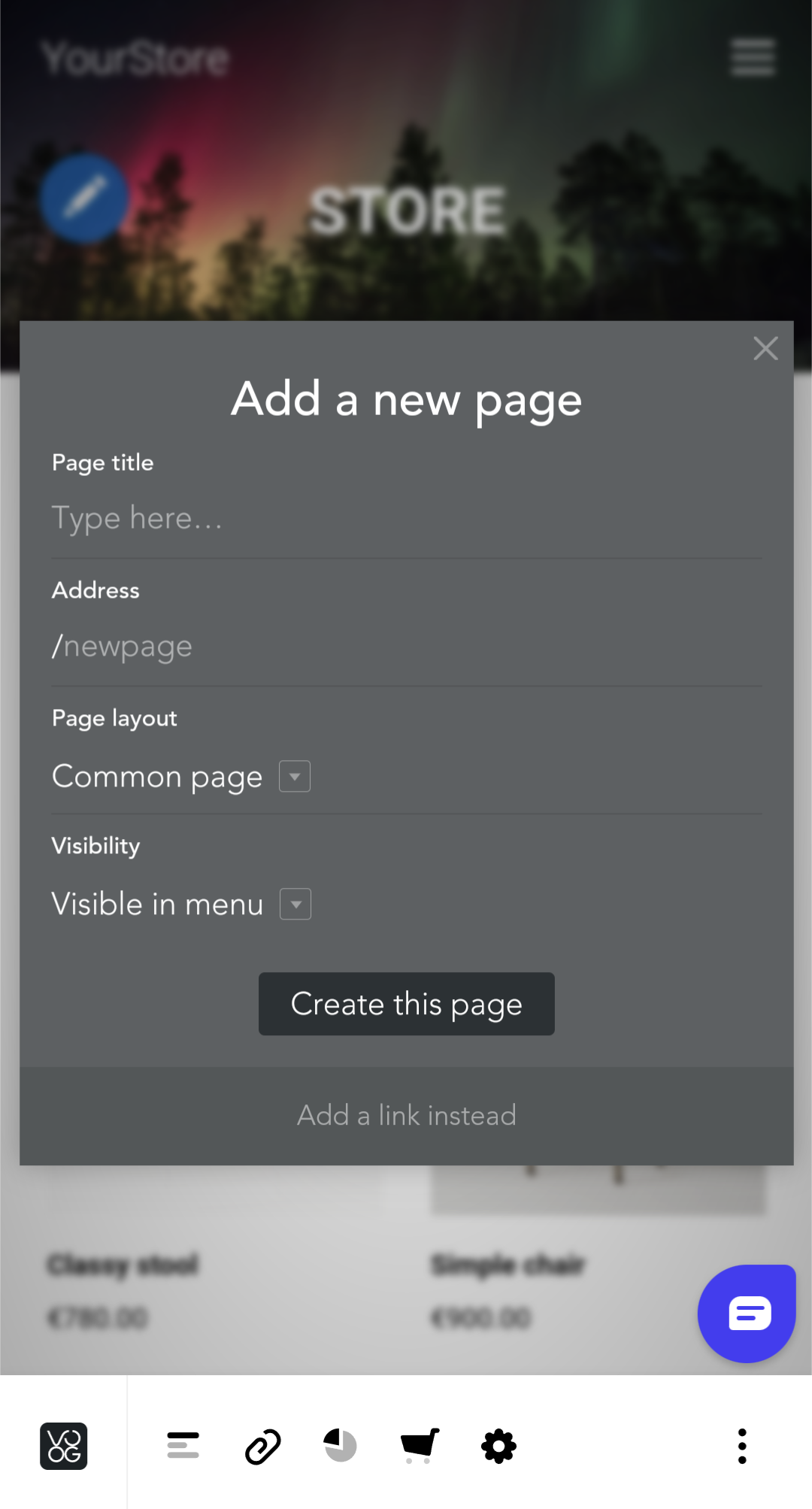

🏆
Draw: Voog vs Webnode
. Both Voog and Webnode do not have a dedicated mobile editor app. However, they allow users to manage and edit their websites using the mobile browser version of the editor. This feature provides convenience for users who need to make quick changes or updates to their websites on the go. However, it’s worth noting that editing websites on a mobile browser may come with certain limitations compared to the full desktop version of the editor. Therefore, for more complex edits or design changes, it’s recommended to use the desktop version. In terms of the mobile editor score, both Voog and Webnode received a score of 5.5, indicating that their mobile editing capabilities are on par with each other.
Product testing options
Product Testing OptionsAssesses the options for trying out platform features before commitment.Score Components:
- Trial quality (40%): Extent and usefulness of the trial or free version.
- Feature accessibility (30%): How many features are available to test.
- Trial duration (20%): Length of the trial period.
- Ease of transition (10%): Smoothness of moving from trial to paid plans.
 8.6
8.6
 5.3
5.3
Overall Result
:
Voog wins
. Voog scores 8.6 in product testing options, significantly higher than Webnode’s 5.3. Voog offers a 30-day free trial during which users can test all premium features. Webnode, on the other hand, offers a free plan with some premium features available for testing, but does not offer a trial version.

|

|
|
|---|---|---|
|
Free Plan |
No |
Yes |
|
Trial Duration |
30 days |
No trial version |
|
Testing Premium Features |
All features during free trial |
Some features with the free plan |
Price
PriceLooks at the cost-effectiveness and value for money of each platform.Score Components:
- Plan value (40%): What each pricing tier offers.
- Transparency and clarity (30%): Clearness of pricing structures.
- Flexibility of plans (20%): Range of options to suit different budgets.
- Hidden costs (10%): Additional expenses not included in the plan.
 7.5
7.5
 7.7
7.7
Webnode offers a wider range of price plans, including a very basic plan for a lower cost, while Voog’s plans are more streamlined and focused on providing more advanced features.

|

|
|
|---|---|---|
|
$0-$10 |
No offering at this amount. |
LIMITED ($5.50/month): Basic plan, 200 MB storage, attach domain, website statistics, up to 5 form fields, last 30 days backup. This plan allows to manage 1 website with unlimited number of pages. Value for Price: 3.0 |
|
$10-$20 |
No offering at this amount. |
MINI ($10.00/month): All essentials for a simple website, 1 GB storage, 3 GB bandwidth, website statistics, 1 email account. This plan allows to manage 1 website with unlimited number of pages. Value for Price: 4.5 |
|
$20-$30 |
Standard (€14/month): Good for simple websites, with unlimited bandwidth, up to 30 website pages, online store with up to 3 products, 3% transaction fees, 5GB file storage, and up to 3 contributors. Value for Price: 6.5 |
STANDARD ($16.90/month): For starting an online store, 3 GB storage, 10 GB bandwidth, 20 email accounts, basic store features. This plan allows to manage 1 website with unlimited number of pages. Value for Price: 6.0 |
|
$30+ |
Plus (€22/month): Recommended for most users for more advanced websites, with free custom domain if annual subscription is purchased, unlimited bandwidth, unlimited website pages, online store with unlimited products, 3% transaction fees, 20GB file storage, and unlimited contributors. Value for Price: 8.0 |
PROFI ($26.50/month): Professional websites, 7 GB storage, unlimited bandwidth, 100 email accounts, full online store capabilities. This plan allows to manage 1 website with unlimited number of pages. Value for Price: 7.5 |
location. As a result in rare cases the prices displayed here can differ from the ones you see on their
websites.
Hosting quality
Hosting
qualityExamines the reliability and performance of the hosting solutions.Score Components:
- Uptime (40%): Consistency and reliability of website availability.
- Speed (30%): Loading times and performance.
- Bandwidth and storage (20%): Sufficiency of resources provided.
- Data centers (10%): Quality and distribution of hosting infrastructure.
 7.7
7.7
 6.3
6.3
🏆
Winner: Voog
Voog offers hosting with unlimited bandwidth, storage ranging from 5GB to unlimited, and automated daily backups. It also guarantees an uptime of 99.9%. On the other hand, Webnode offers hosting with bandwidth ranging from 1GB to unlimited and automated backups on higher plans, but does not guarantee uptime. Neither Voog nor Webnode disclose their hosting type or the locations of their data centers.

|

|
|
|---|---|---|
|
Do they offer hosting? |
Yes, with unlimited bandwidth, from 5GB to unlimited storage and automated daily backups. |
Yes, with from 1GB to unlimited bandwidth and automated backups on higher plans |
|
Type of hosting: |
Not disclosed |
Not disclosed |
|
Uptime: |
99.9% |
99.6% |
|
Uptime Guarantee: |
Yes, 99.9% |
No |
|
Data Centers: |
Not disclosed |
Not disclosed |
Website Speed Optimization
Website Speed OptimizationEvaluates optimization of website loading timesScore Components:
- PageSpeed Score (30%): Google’s score indicating performance optimization.
- Loading Time (30%): The average time until a website is fully interactive.
- Mobile Optimization (15%): Optimization effectiveness for mobile devices.
- Resource Optimization (15%): Optimizing images, scripts, and other heavy resources.
- CDN Usage (10%): Use of CDN to enhance speed across geolocations.
 6.2
6.2
 6.1
6.1
🏆 Winner: Tie
. Both Voog and Webnode have similar strategies for speed optimization and do not provide any information on their Core Web Vitals improvements. Therefore, the winner cannot be determined based on the provided information.

|

|
|
|---|---|---|
|
Focus |
Mobile Responsive design, Caching, Image Optimization, Code minification |
Code Minification, Image Optimization, Caching |
|
Performance Tools |
Not provided |
Not provided |
|
Key Strategies |
Mobile Responsive design, Caching, Image Optimization, Code minification |
Code Minification, Image Optimization, Caching |
|
Load Times |
Varies depending on optimization and website complexity |
Varies depending on optimization |
|
Page Speed Scores Range |
Not provided |
Not provided |
|
Core Web Vitals Improvement |
Not provided |
Not provided |
Voog and Webnode both focus on mobile responsive design, caching, image optimization, and code minification to optimize website speed. However, they do not provide any specific information on their load times, PageSpeed score ranges, or Core Web Vitals improvements. Therefore, it is not possible to determine a clear winner based on the provided information. Both platforms emphasize the importance of website speed optimization and provide tools and strategies to help users improve their website’s performance. However, users are advised to conduct their own tests to determine which platform best meets their specific needs.
Get a head start on website creation with AI
Create a custom website tailored to your business needs 10X faster with 10Web AI Website Builder!
Plugins and integrations
Plugins and integrationsMeasures the range and effectiveness of additional plugins and integrations.Score Components:
- Variety of options (40%): Range of available add-ons.
- Integration smoothness (30%): Ease of integrating plugins into the site.
- Quality of plugins (20%): Functionality and reliability of the options.
- Custom integration capabilities (10%): Support for custom or third-party integrations.
 6.7
6.7
 6.8
6.8
🏆 Winner: Webnode.
With a score of 6.8, Webnode slightly edges out Voog, which scores 6.7. Webnode’s plugins, developed by Elfsight, cover a wide range of applications including social media, reviews, e-commerce, chats, and forms. Voog, on the other hand, offers integrations in areas such as Finance, Social Media, Utilities, and Shipping. Both platforms offer a variety of pricing options for their plugins, providing flexibility for users.
While Voog’s integrations enable features like advanced payment options, social media engagement, sophisticated email marketing capabilities, and streamlined e-commerce logistics, Webnode’s plugins offer advanced options for SEO, e-commerce, social media integration, and security.
In terms of top integrations, Voog offers key integrations with payment processors like Swedbank, Makecommerce, EveryPay, Luminor, Montonio, Stripe, and PayPal; social media platforms like YouTube, Vimeo, Tumblr, Twitter, Facebook, Instagram, and Messenger; utilities like AWeber, Google Maps, Google Workspace, Widgetic, Mailchimp, ERPLY Books, Smaily, Ecwid, and Free Privacy Policy; and shipping options through Omniva, Smartpost, DPD, and Outvio.
Webnode, on the other hand, offers a wide range of plugins for enhancing functionality and user engagement, including social media feeds (e.g., Facebook, Instagram, Twitter), video and audio players (YouTube Gallery, Podcast Player), review widgets (Google Reviews, TripAdvisor Reviews), chat services (WhatsApp Chat, Facebook Chat), e-commerce tools (PayPal Button, Countdown Timer), and various utilities (Event Calendar, Google Maps).
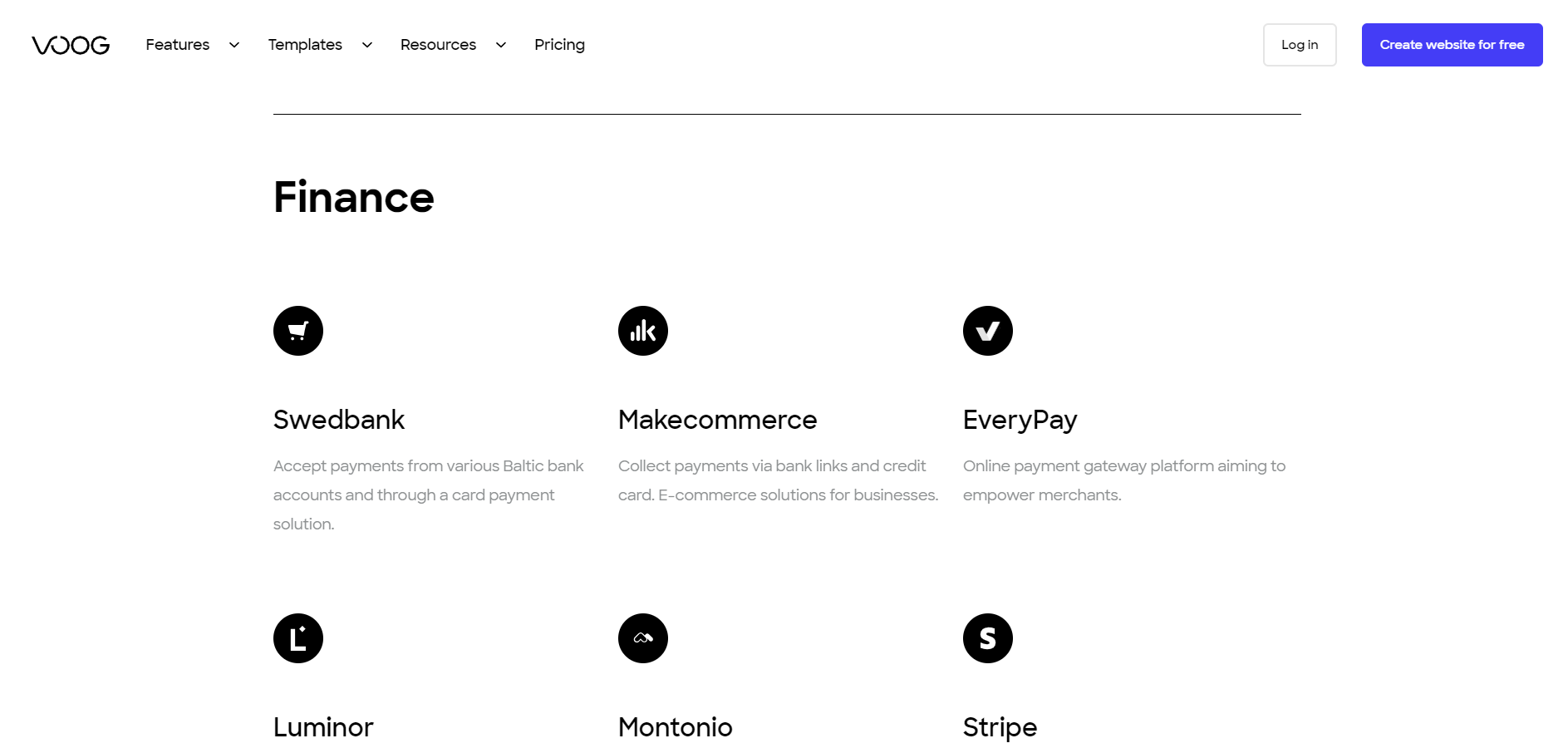

Marketing Features
Design FunctionalitiesRepresents how well each platform allows for creative design and customization of websites.Score Components:
- Template Variety (30%): Range and quality of design templates.
- Customization (30%): Flexibility and options for design alterations.
- User Interface (20%): Ease and intuitiveness of the design process.
- Responsiveness (10%): Adaptability to different devices and screen sizes.
- Innovation (10%): Unique design features and tools.
 6.9
6.9
 5.5
5.5
🏆
Overall Winner: Voog
. Voog edges out Webnode with a slightly higher score in marketing features. Both platforms offer a similar range of tools, but Voog’s integrations and multilingual support make it a more versatile choice for businesses targeting a global audience.

|

|
|
|---|---|---|
|
SEO Tools |
✓ |
✓ |
|
Email Marketing |
✓ (through third-party integrations) |
✓ |
|
Blogging |
✓ |
✓ |
|
Social Media Integration |
✓ |
✓ |
|
Analytics and Reporting |
Basic built-in analytics tools, and integration of Google Analytics |
Integration with Google Analytics and Google Search Console |
|
Ads and Promotions |
✓ (through third-party integrations) |
✓ |
Customer Support
Customer supportEvaluates the quality and availability of support options.Score Components:
- Response time (40%): Speed of support responses.
- Support quality (30%): Effectiveness and helpfulness of the support.
- Availability (20%): Range of support channels (phone, chat, email).
- Resource richness (10%): Quality of self-help and educational materials.
 6.1
6.1
 5.3
5.3
🏆 Winner: Voog
. In the Voog vs Webnode comparison, Voog takes the lead with a customer support score of 6.1. Voog offers support 7 days a week through email and provides a comprehensive range of support guides to assist users with various aspects of website building. This makes it a reliable option for users who need consistent support.
Webnode, on the other hand, has a customer support score of 5.3. It offers support in more than 20 languages and is available five days a week. While email support is the primary channel, premium customers receive priority phone support. However, the lack of general phone and live chat support, along with limited availability during weekdays, makes it less accessible compared to Voog.
Security
SecurityLooks at the platforms’ security measures and data protection.Score Components:
- Data protection (40%): Safeguards for user and customer data.
- SSL and encryption (30%): Implementation of secure connections.
- Compliance (20%): Adherence to industry security standards.
- Regular updates (10%): Frequency of security updates and patches.
 7.7
7.7
 7.7
7.7
Winner: Tie
. Both Voog and Webnode prioritize user data protection and website security, earning them equal scores in this category. Voog simplifies the process for users by managing technical aspects like hosting, security updates, and backups. It also provides SSL encryption for website security. Webnode, on the other hand, offers a variety of security measures, including a Premium Site Security add-on with IP Filters, Form Protection, and Malware Scanning for premium users. All Webnode sites are automatically secured with HTTPS, ensuring safe browsing for visitors.
AI Capabilities
AI capabilitiesMeasures the effectiveness of AI-driven features and tools.Score Components:
- Automation efficiency (40%): Impact of AI on streamlining processes.
- Personalization (30%): AI-driven customization for users or customers.
- AI-Assisted design (20%): Role of AI in website design and functionality.
- Data analysis (10%): Use of AI in interpreting user data and analytics.
 0
0
 5.3
5.3

|

|
|
|---|---|---|
|
AI Builder |
|
Webnode AI builder streamlines the website creation process |
|
AI Ecommerce features |
|
|
|
AI Content Generation |
|
|
|
Additional AI features |
|
|
🏆 Winner: Webnode
. Webnode, with a score of 5.3, has an AI builder that helps streamline the website creation process. The AI builder generates a custom website that aligns with the user’s needs, including creating text content and sourcing relevant images. This makes Webnode a more user-friendly platform for website building.
Voog, on the other hand, does not have any AI capabilities. This means that while Voog may offer other features that are beneficial to users, it does not provide the added convenience and efficiency that AI capabilities can offer.
User Management
User ManagementAssesses the platforms’ capabilities in managing user roles, permissions, and accessibility.Score Components:
- Role Customization (40%): Flexibility in creating and defining user roles and
permissions. - Ease of Management (30%): User interface and tools for managing users.
- Access Control (20%): Effectiveness of access control measures for different user
levels. - Scalability (10%): Ability to manage a growing number of users efficiently.
 7.3
7.3
 6.9
6.9
🏆 Winner: Voog
. Both Voog and Webnode offer flexible user management options, but Voog edges out with a slightly higher score.
- Voog allows up to 3 contributors for the Standard plan, with no limit for the Plus or Premium plans. This flexibility caters to both small teams and larger organizations.
- Webnode’s user management varies with the subscription plan. The free version provides limited user access, while premium plans offer more flexibility, including multiple users with different roles and permissions.
Voog User Roles and Access Levels:
| Role | Description | Access Highlights |
|---|---|---|
| Admin | Admins, also known as owners, have full control over the website. They can manage all aspects of the site without any restrictions. | Full site management, including key account settings like subscription info. |
| Editor | Editors can manage certain aspects of the site, but they do not have access to key account settings. Their role is more focused on content management. | Limited to certain site settings; cannot manage subscription or account settings. |
Webnode User Roles and Access Levels:
| Role | Description | Access Highlights |
|---|---|---|
| Website Owner | The individual or entity that owns the Webnode website. | Full access: can modify site structure, design, content, and manage user roles. |
| Administrator | Users with administrative privileges assigned by the website owner. | Nearly full access, including content management, and some settings adjustments. |
| Editor | Users tasked with creating, editing, and publishing content. | Access to add and edit content, blog posts, and pages, but cannot alter design. |
| Contributor | Users who can contribute content but cannot publish it. | Can draft content but need approval from an Editor or Administrator to publish. |
| Viewer/Visitor | Individuals who visit the website without any editing permissions. | Can view the public website and interact through comments or contact forms. |
| E-commerce Manager | Specifically for websites with an e-commerce component, managing products. | Can add, edit, and manage products, orders, and customer interactions. |
Additional Features

|

|
|
|---|---|---|
|
SSL Certificate |
✓ |
✓ |
|
Custom Domain |
✓ |
✓ |
|
Free Custom Domain Included |
✓ |
✓ |
|
International Domains |
✓ |
✓ |
|
Mobile Responsive |
✓ |
✓ |
|
Page Speed |
✓ |
✓ |
|
Website Builder Mobile App |
X |
X |
|
Convert a Website To An App |
X |
X |
|
Website Analytics |
✓ |
✓ |
|
Multilingual Sites |
✓ |
✓ |
|
Multiple Users |
✓ |
✓ |
User Feedback
Voog receives high praise for its ease of use, allowing users to create their workspace seamlessly. Users appreciate its multilingual support and problem-solving capabilities, which enhance client navigation and overall user experience. However, some users wish for a more diverse selection of stock photos. With a G2 rating of 4.5/5 from 2 reviews, Voog stands out for its simplicity and design focus, making it a strong choice for international businesses and personal sites.
Webnode, on the other hand, is celebrated for its user-friendly interface and rapid website creation capabilities. It offers a wide range of templates, making it popular among beginners. Despite its ease of use, some users desire more flexibility and customization options, particularly in themes and e-commerce features. With a G2 rating of 4.1/5 from 10 reviews, Webnode is a solid option for those with little to no coding knowledge, though it may not fully meet the needs of users requiring advanced functionalities or dedicated customer support when comparing Voog vs Webnode.
The making of this blog
We followed a clear, step-by-step process to write and research this article.
FAQ
Which platform is better for multilingual websites, Voog or Webnode?
Can I use both Voog and Webnode for ecommerce?
How do Voog and Webnode compare in terms of ease of use?
Which platform offers better customer support, Voog or Webnode?
How do the website editors of Voog and Webnode compare?
Which platform is more affordable, Voog or Webnode?
Do Voog and Webnode offer similar website speed optimization strategies?
Which platform has better plugins and integrations, Voog or Webnode?
Can I create a free website with Voog or Webnode?
Which platform is recommended for users needing advanced marketing features?










